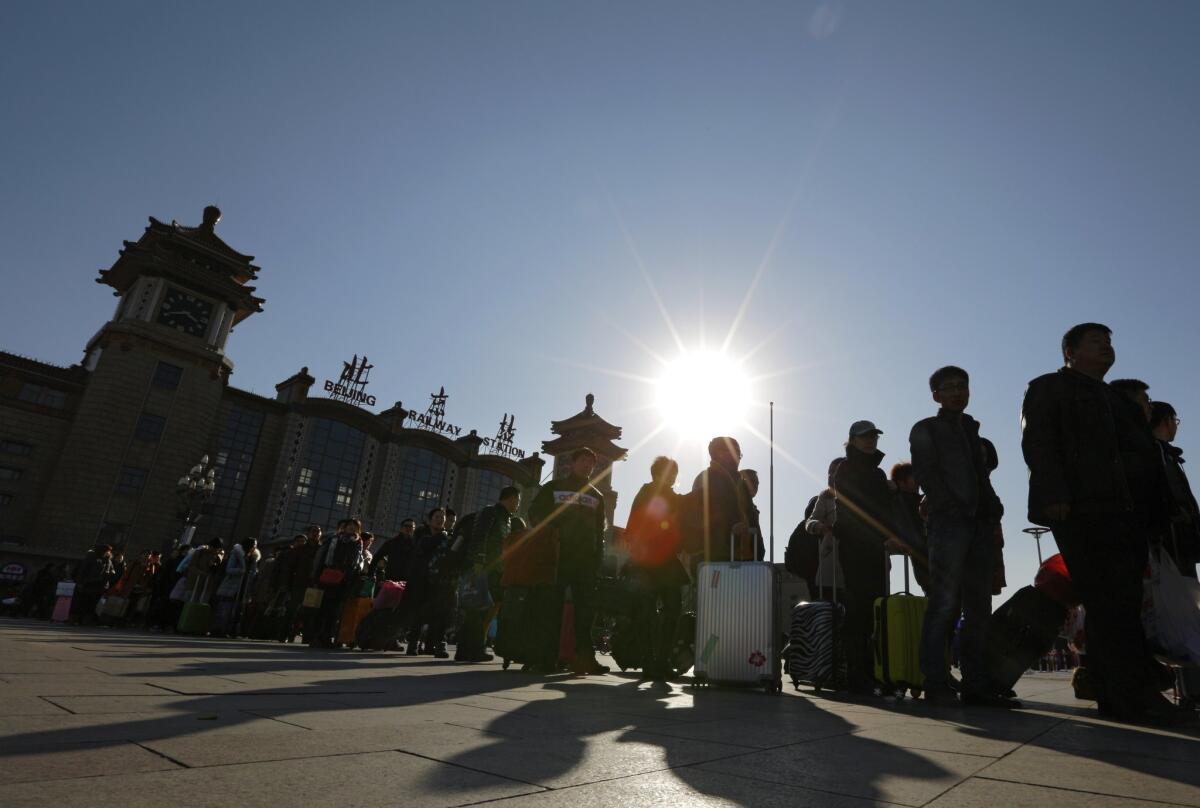To ring in the year of the sheep, more Chinese go abroad

For millenniums, Chinese New Year has been a time for family. With government offices, factories and many other businesses closed, people travel -- sometimes for days -- to teary-eyed reunions over bountiful meals, gifts of red envelopes and colorful fireworks. But this year, many Chinese bucked centuries of tradition and left China during the weeklong holiday, which ran Feb. 18-24.
Many of those skipped family reunions and simply went sightseeing.
On the last day of the holiday, the China National Tourism Administration said more than 5 million Chinese traveled abroad during the break, a 10% rise compared with last year.
Of those who said they were traveling during the period for leisure, nearly 60% went abroad, according to data from the China Tourism Academy. It was the first holiday period in which the academy had found more sightseers were going overseas rather than staying in the country.
Many of these tourists want to avoid what’s often been called the largest human migration in the world -- when hundreds of millions of Chinese clog the country’s trains, airports, highways and buses in a frenzy to get home. Favorable exchange rates and easing visa restrictions are also opening the door for more adventurous travelers to choose an exotic early-spring vacation.
No matter where they go, though, they are spending. The tourism academy said Chinese travelers were expected to spend more than $22 billion during the holiday. This benefits nearby countries such as South Korea and Japan, which were the most popular destinations for outbound tourists.
Japan recently eased visa requirements and issued 250,000 tourist visas in China in January, 70% more than the same period last year. Many Chinese were eager to take advantage of Japan’s weakening yen. The country’s ski resorts, hotels and department stores all noted impressive growth, with Japanese media reporting some department stores having four-fold increases during the holiday.
But even more distant destinations are seeing growth from Chinese tourists. Almost 288,000 Chinese went to Spain in 2014, up nearly 14% from a year earlier, according to the U.N. World Tourism Organization. Chinese became the biggest spenders in Spain last year, topping Russians, and generating 31% of the country’s tourist revenue, a report from consultancy Global Blue said this week.
But they spend the most in Paris, Chinese tourists’ favorite foreign destination. A report from HSBC found that Chinese in Paris spent 80% of their vacation budget on shopping.
Mainland Chinese are increasingly avoiding Hong Kong, a semi-autonomous Chinese territory where strong anti-mainland sentiment has pushed away visitors. This year, the number of visitors from mainland China dropped during Chinese New Year, the first such year-on-year decline since the former British colony was returned to Chinese sovereignty nearly 20 years ago.
Anger against mainlanders -- and particularly those who buy items in bulk to resell back home -- can affect regular tourists. Hong Kong police wielding batons and pepper spray were deployed this month to break up a protest against mainlanders in a shopping mall, with locals chanting “Mainlanders go back to China!”
Hong Kong’s leader, Leung Chun-ying, has said he will discuss whether authorities should limit the number of permits issued to allow mainlanders to visit the territory. Those are issued by the mainland Chinese government, not Hong Kong officials.
Authorities in neighboring casino hot spot Macao, another semi-autonomous Chinese territory, have also discussed whether to adopt similar anti-crowding measures. Chinese visitors to the tiny territory rose 6.7% during the first four days of Chinese New Year, to over 443,000, compared with 2014, Macanese authorities said. Such proposed limits could be another blow to casino operators, which are already struggling with a loss of business amid China’s pervasive anti-corruption campaign.
Not all Chinese are happy about their countrymen leaving the nation to shop -- particularly in Japan. Territorial disputes and historical animosities rooted in the World War II era continue to strain relations between the two countries.
An editorial on the popular Chinese news portal ifeng.com noted that “there are a variety of reasons for Chinese to spend in Japan.” But it went on to say that when “the Japanese government has made a number of hostile actions and China is faced with the need to stimulate domestic demand, how can Chinese people pull up Japan’s [economy]?”
But in Japan, many business owners seemed to harbor no ill feelings toward the Chinese masses. Sannyu Kanbayashi, an owner of a tea shop near Kyoto, was elated by the new business.
“I have worked in this shop for more than 40 years,” he told Japan’s Asahi Shimbun. “This is the busiest it has ever been.”
Silbert is a special correspondent.
More to Read
Sign up for Essential California
The most important California stories and recommendations in your inbox every morning.
You may occasionally receive promotional content from the Los Angeles Times.










